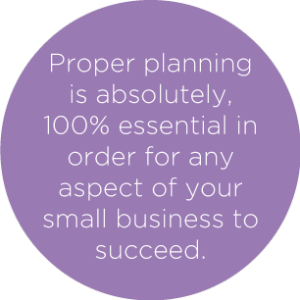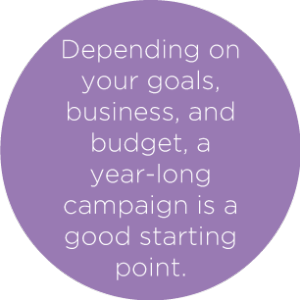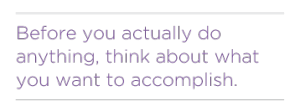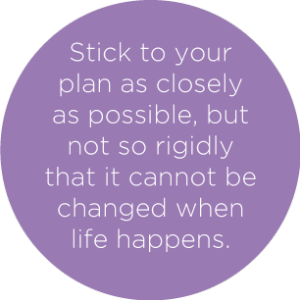“A goal without a plan is simply a wish.”
This is a quote from French author and aviator Antoine de Saint-Exupéry. I nearly went with Benjamin Franklin’s “If you fail to plan, plan to fail” quote, but thought it just a bit too glass-half-empty. The message from both should be clear, though – proper planning is absolutely, 100% essential in order for any aspect of your small business to succeed, and promotional campaigns are definitely no different.
How Thorough Planning Will Help Your Small Business Marketing, Public Relations, and Promotional Campaigns Succeed
For the purposes of this blog entry, we’ll define a promotional campaign as any sort of sustained, concentrated public relations, marketing, or advertising effort that you and your small business will be executing. The best plans will incorporate elements from all three disciplines, but the specifics will vary depending on your business type, its size, its area of reach, how long it’s been in operation, and what you’re trying to accomplish for the business itself. Which is a good segue into our first question that you should ask yourself before starting your promotional campaign…
1. What Are Your Goals?
 A crucial step before you actually DO anything is to think critically about what you want to accomplish with your soon-to-be executed activities. Try to be as specific as possible – something like “increasing awareness” is obviously a good goal to have, but that is pretty broad and ultimately what all PR, marketing, and advertising hopes to accomplish at the end of the day.
A crucial step before you actually DO anything is to think critically about what you want to accomplish with your soon-to-be executed activities. Try to be as specific as possible – something like “increasing awareness” is obviously a good goal to have, but that is pretty broad and ultimately what all PR, marketing, and advertising hopes to accomplish at the end of the day.
Getting as targeted as “Bringing in $X over the next Y months” or “Signing up Z customers to our customer loyalty reward program” will not only help hone your voice and message, but will also be easily traceable to judge your campaign’s success. Also, be realistic with your goals – nothing will help your program and your skills as a small business owner feel less successful than not meeting your goals. Don’t make them ridiculously easy to achieve, but be honest with yourself and set reachable milestones that will make a tangible impact to your business.
2. What Are The Details?
Think of everything you can when creating your small business marketing plan. What are your plans for promoting major holidays? How is your new campaign going to dovetail into any current in-business promotions you may be already running (loyalty rewards program, email marketing, etc.)? Is there anything in your campaign that will require you to travel or be away from your business for a length of time, and if so, will it conflict with any major beats in your promotional calendar? What will be your focus – earned media and PR-generated buzz such as interviews, guest-blogging, and the like, or advertising via Facebook and Google Ad Words?
 When first starting your plan, throw everything you can think of into the “maybe” column and then weed through it from there to find what truly makes sense. Once you have a pared-down, super concentrated list of details, you’re ready to move on to making the calendar…
When first starting your plan, throw everything you can think of into the “maybe” column and then weed through it from there to find what truly makes sense. Once you have a pared-down, super concentrated list of details, you’re ready to move on to making the calendar…
3. What Is Your Timeline?
Creating a calendar that has all the major and minor “beats” (i.e. – action items) scheduled out down to the day is a huge step to stay on track and achieve success. This calendar is going to be your best friend throughout the entire duration of your campaign. You will learn to love waking up and checking it first thing to see what’s on the docket for today. It should have everything from major items and to-dos (“Interview with local newspaper at 3:00 p.m.”, “Send printer final text copy for postcard mailers”) to minor check-up or maintenance tasks (“Check progress of Facebook ads”, “Bi-weekly Twitter update”). Sync your calendar to your smartphone so you don’t have to be in front of your laptop or desktop to have access to it. Now that we’ve established how essential the calendar itself is, the question of how long it should be will depend on your campaign.
Depending on your goals, business, and budget, a year-long campaign is a good starting point. Not only will this allow you to incorporate promotional ideas for all major and applicable holidays, but it’s a nice, tidy unit of time that will allow you to have a large enough sample pool to determine the success of your campaign. This is not to say that you’re required to have action items on 365 days for the calendar – determine what makes sense for you and add it to the calendar.
 4. Who’s Going To Do It?
4. Who’s Going To Do It?
While some aspects of a promotional campaign can very easily be undertaken by yourself, the more variables and beats you have in your timeline, the more time you will be forced to spend away from the day-to-day running of your business. Depending on your situation, this may not be a dealbreaker in the slightest. But if you’re already running ragged and operating your outfit on a skeleton crew, you probably won’t be doing yourself or your promotional campaign any favors by trying to do it all yourself.
Public Relations agencies are available for hire in nearly every neck of the woods, and are comprised of professionals who handle media relations, crisis management, brand awareness, and image improvement for a living. They are typically hired on a retainer basis, and that retainer can be flexible depending on the size of your business and your budget. They will handle all press releases you’ll put out, will secure interviews and guest-blogging opportunities, and outreach local and non-local media outlets to secure your business in trend stories, among other tasks.
A marketing agency will carry out any marketing related activities for you as well – the line between marketing and PR can sometimes be confusing, but a good, generalized guideline is that PR opportunities are generally free, while marketing opportunities are generally paid for. Most marketing agencies will handle your SEO, B2B partnerships, as well as placing your advertisements for you. You’ll still need to foot the bill for the ad itself, they’ll just handle the maintenance of it. And while it won’t be applicable to most small businesses, there are lots of ad agencies out there as well that will handle the creative aspects of any advertising campaign you would wish to run. They tend to be pricey however, and are probably out of budget for most small business owners (think Mad Men).
 Many marketing agencies can assist in the creative aspect of the ads for your campaign, and will collaborate with you to come up with an agreeable solution. Handing your promotional efforts off to a professional agency can be a huge load off for a small business owner, but it comes with a cost – which brings us to our next question…
Many marketing agencies can assist in the creative aspect of the ads for your campaign, and will collaborate with you to come up with an agreeable solution. Handing your promotional efforts off to a professional agency can be a huge load off for a small business owner, but it comes with a cost – which brings us to our next question…
5. What Is Your Budget?
An absolutely critical element to a well-thought out promotional campaign is how much you are willing and able to spend on it. Most small business owners already have a marketing/advertising budget for the year (and if you don’t, you should) – this figure will serve as a good starting point, but to have a bigger splash, you’ll most likely have to fork over a bit more cash for some of the beats in the promotional campaign. After all, this isn’t simply going to be the same marketing tasks as you’ve done in years prior – this promotional campaign exists for you to shake things up and try new things to get your business noticed.
 6. What Happens When Things Need To Change?
6. What Happens When Things Need To Change?
“The best laid plans of mice and men often go astray” is a paraphrasing (or more accurately, de-18th Century Scott-ified) version of a Robert Burns quote – not only does this keep with our quote theme for today, it also tells us that even if you’ve planned for everything and your calendar is synced up to the most minute detail…things can and will change. You could lose an employee (or several). You could become ill or have to take an extended absence from the business. You could see a new competitor open up shop just down the road that will require a different strategy. The point is that while it should still be viewed as undoubtedly essential to create a detailed plan and calendar, don’t stick to it so rigidly that it cannot be changed, especially when reason dictates that it should.
Your plan and calendar should be seen as living, breathing documents that can and most likely will be updated through the duration of the campaign. Stick to it as closely as possible, but don’t be afraid to call an audible or two at the line of scrimmage.
Though time consuming, proper planning is essential
If you’re serious about running a successful small business marketing campaign, take the time (however much that may be) to create a solid plan and calendar. Create realistic yet admirable goals for success. Create a budget that will allow you to carry out some innovative and new marketing spends without taking you out of the black. Consider outside help with your promotions if you have the money and don’t have the time (or expertise) to do it yourself. Proper planning is essential, and may very well take longer than carrying out the plan itself. After all, as Abraham Lincoln once said, “Give me six hours to chop down a tree and I will spend the first four sharpening my axe.”





How can you apply this for small business owners who rarely have the time to update their social media, i guess having smart phones and social media apps will help them update their social media while on the go. I think actually updates rather than scheduled updates are more effective ways to prove that you are committed not only to your followers but to your business too.
Great tips Jerry. When creating a marketing plan you almost have to work backwards from your desired finishing point. Therefore starting with the goals you want to achieve and then deciding how best to go about achieving them is a great formula to use.
Yes we all need to start with what are our goals. What specific action do we want the prospect/customer to make as a result of our marketing? That is the question and the goal. Great questions.
Hi Sarah!
You’re absolutely right, updating social media on the spot and interacting with customers in real time is a great to way show your authenticity and dedication to building real relationships with your customers. I definitely recommend all business owners do this as much as they are able to with their busy schedules.
Since most business owners don’t have tons of extra time to post daily or regularly on social networks, it’s good to set aside a specific time to plan out helpful posts and you can schedule them ahead of time with Facebook Scheduled Posts (when making a post on your Facebook business page, you click the clock button on the post before you click “Post”) or for posting on multiple networks, you can use something like Hootsuite Publisher.
But you should definitely interact with customers alongside your scheduled messages. No one likes an impersonal robot!
Great article … just a few notes.
Social media is not a strategy, it’s a means to an end.
Assessing the market, competition, trends improves both goals and strategy and should be the first step.
Some small biz don’t believe they have the time (or the need) for a plan. But, those who do take the time actually save money & time as they move forward.
Working backward, yes. But in my experience the starting point, before setting a goal of “x new clients” or “x$ in sales, is to decide exactly WHO you’re targeting. What is a new customer that FITS THAT PROFILE worth and therefore, how much can you spend to acquire a new one? The answer to this question helps set the budget, the message and the tools to use to deliver that message. We spend a lot of time profiling profitable customers . . . !
great tips! its a big help.